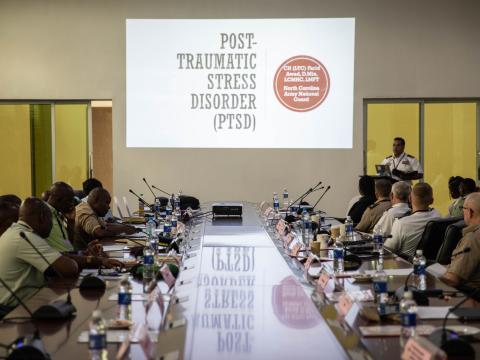JFCOM Leaders Discuss CCJO War Game
The U.S. military and representatives from other government agencies are taking part in a war game this week to explore the Capstone Concept for Joint Operations (CCJO).
The U.S. military and representatives from other government agencies are taking part in a war game this week to explore the Capstone Concept for Joint Operations (CCJO). The experiment comprises three conflict scenarios: one engaging another nation-state, the second involving a fragile state and the third against a globally networked non-state adversary.
Vice Adm. Robert S. Harward, USN, deputy commander, U.S. Joint Forces Command (JFCOM), and Rear Adm. Dan W. Davenport, USN, director, Joint Concept Development and Experimentation Directorate, JFCOM, discussed the event and answered questions during a media roundtable today. Because the experiment is only its third day, details were scarce; however, the two were candid about what the military hoped to gain from the war game.
The CCJO is viewed as the fundamental framework for operating in the future. Adm. Davenport explained that the goal of the experiment is to explore the CCJO and take a closer look at the joint forces that would be needed to employ the concept. The admirals revealed that results from the event will be shared with officials creating the 2010 Quadrennial Defense Review and is likely to influence the review significantly.
Although the CCJO is designed to address what capabilities and techniques the joint force will likely need to face future conflicts, the war game, which is taking place in McLean, Virginia, includes capabilities from current programs of record or those predicted to be programs of record in the near future.
The three scenarios are being run simultaneously, without official interaction; however, Adm. Davenport allowed that a lot of discussion has been going on between the three groups. While they were partially scripted, Adm. Davenport noted that the red team had access to a considerable number of game-changing technologies to challenge the blue teams' joint forces.
As Gen. James N. Mattis, USMC, commander, JFCOM, and NATO's supreme allied commander transformation, explained at the recent Joint Warfighting Conference, the military is exploring what it will take to reorganize some of the troops and increase the number of small unit forces in the field. Adm. Harward emphasized that the experiment takes a serious look at how these units, which could consist of as little as one or two warfighters, would operate even if the communications network is brought down. He said this requires a thorough knowledge of the commander's intent but more importantly adequate training of all warfighters. An increased focus on command and control also will address this issue, he said.
Although simulation has been used extensively to train military pilots, the question is whether warfighters operating on the ground have the same opportunities to train in simulations before going into battle. This is an area that must be examined, Adm. Harward said.
According to Adm. Davenport, a final report of the findings of the CCJO war game will be released to the public by the end of July.



